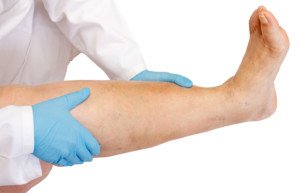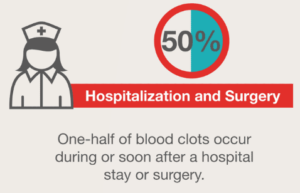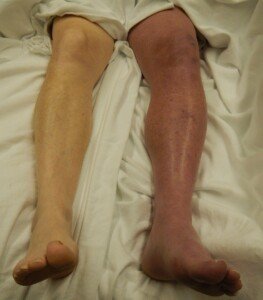
You know that excess sitting can cause a DVT, but what about sleep?
How much sleep is too much sleep when it comes to causing a blood clot in your vein?
“Excessive sleeping means you are in a reclined position for much of the time,” says Kathryn Boling, MD, a board certified family medicine practitioner with Mercy Medical Center in Baltimore, MD.
Dr. Boling continues, “Inactivity for any reason – a long plane flight, injury, hospitalization, or excessive sleeping could put a person at risk for a DVT.
“You’re on bed rest or sit for long periods of time. The deep veins in the center of your legs depend on muscles to force blood back to your lungs and heart.
“If muscles don’t move for a while, blood starts to pool in your lower legs. This makes it more likely for a clot to form.”


Deep vein thrombosis. James Heilman, MD, CreativeCommons
Just what is “excessive” sleep anyways?
- Sleeping over eight hours/day increases the risk of stroke (Leng et al, Neurology, 2015).
- Sleeping over 10 hours is linked to heart disease in people 45+ (CDC, Liu et al, SLEEP, 2013).
There are many more studies concluding that excess sleep is a gateway to an early grave, such as the one published in PLOS Medicine (Ding et al, 2015), reporting that the combination of sleeping nine+ hours and excessive daytime sitting is deadly.
The take-home message is to limit overnight sleep to eight hours (no more!) and to avoid the “sitting disease” during the daytime to help protect against DVT.
Other risk factors for a deep vein thrombosis include smoking, lack of structured exercise, obesity and use of birth control pills.
Symptoms of a DVT include calf pain and/or a swollen lower leg.
Less commonly, the swelling can occur in the thigh or pelvic area if the clot is higher up.
The area of suspicion may also feel unusually warm or tender to the touch.










































